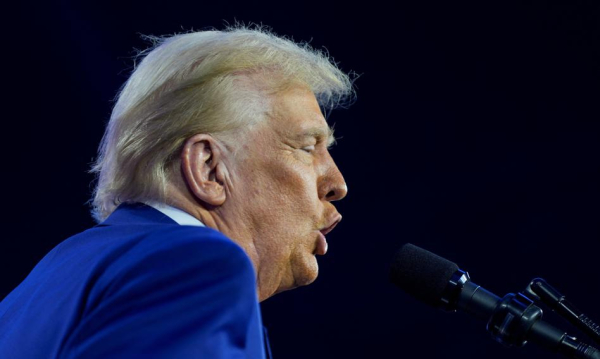US President Donald Trump announced Wednesday that he would raise tariffs on goods from China to 125% while ordering a 90-day break in tariffs for other countries. During that time, tariffs will remain at 10%. Wall Street responded with big gains.

“Given the lack of respect China has shown for global markets, I am hereby raising the tariffs imposed on China by the United States of America to 125 percent, effective immediately,” the president wrote in a post on his social media site Truth Social. He added that he hopes “China will realize that the days of ripping off the United States and other countries are no longer sustainable or acceptable.”
It is the latest blow in the U.S.-China trade war after China on Wednesday retaliated again for increasing U.S. tariffs on Chinese goods to 104% by increasing its own tariffs to 84% on U.S. imports.
Read also
Bessent: We want to make deals with allies and face China together
At the same time, Trump announced that because more than 75 countries had approached Washington with offers of trade negotiations and these countries had not retaliated, he had decided to suspend the increased rate for the remaining countries for 90 days. During that time, the rate is to be 10 percent.
NEW TRUTH SOCIAL FROM PRESIDENT TRUMP:
🇨🇳125% TARIFF ON CHINA
🌎90-DAY PAUSE & LOWERED 10% RECIPROCAL TARIFF FOR OTHER COUNTRIES🚨EFFECTIVE IMMEDIATELY pic.twitter.com/Gt5Bd6276m
— The White House (@WhiteHouse) April 9, 2025
Trump: People got a little scared, that's why I stopped the tariffs
People got a little scared, a little afraid, US President Donald Trump said on Wednesday, justifying the decision to suspend higher tariffs for most countries for 90 days. He also said that one needs to be flexible.
“People are jumping out of line a little bit. They got a little scared, people were afraid,” Trump said during a meeting with rally drivers in front of the White House, when asked about the reasons for the sudden suspension of high tariffs imposed on almost 60 countries in the world, including the EU.
Trump responded that he had been watching financial markets which had been “gloomy” in recent days and that people watching U.S. bond yields soar on Tuesday were “starting to feel nauseous.”
Trump's comments appeared to contradict words said an hour earlier by Treasury Secretary Scott Bessent and White House spokeswoman Karoline Leavitt, who said that “this was the plan all along” and that Trump's decision demonstrated his “art of the deal” (“Art of the Deal,” the title of his book).
Trump has rejected suggestions that his sudden changes of heart undermine his credibility, saying “flexibility” is necessary.
“It's not about that. It's about flexibility. I could say, here's a wall and I'm going to go through it. I'm going to go through it no matter what. (…) Sometimes you have to be able to go under the wall, around the wall. These guys know that better than anyone,” Trump said, pointing to the rally drivers who accompanied him.
The US president expressed confidence that he would be able to reach “fair” trade agreements with all countries – including China, on which he imposed 125 percent tariffs on Wednesday. He said that China is a “proud nation” and its leader Xi Jinping is a “proud man” and wants to make a deal with the US, but does not know how to go about it. He did not rule out exemptions from tariffs for some American companies, adding that he would make a decision in this matter “instinctively”.
However, he still argued that the imposition of tariffs was necessary because otherwise “we would not have a country.”
“Negotiation Strategy”
As Finance Minister Scott Bessent told reporters after the decision was announced, the reason for suspending the tariffs was not the chaos and stock market declines, but the overwhelming number of countries wanting to negotiate trade terms with the United States.
“We saw a successful negotiation strategy that President Trump implemented last week. It got over 75 countries to negotiate. It took great courage, great courage for him to stay the course to this point,” Bessent said. “As I told him last week in this same place, 'don't retaliate,' and you will be rewarded. So every country in the world wants to come and negotiate. We are ready to listen to them,” he added.
The U-turn comes a day after the president and his spokeswoman, Karoline Leavitt, insisted he was not considering a 90-day tariff suspension. Even U.S. Trade Representative Jamieson Greer, who was appearing before the House Budget Committee when the suspension was announced, seemed surprised by the announcement. He said he learned of Trump’s decision during the hearing, though he added that there had been discussions about it. Democratic congressman Steven Horsford, who was questioning him, exploded in anger and began shouting at Greer, accusing the administration of market manipulation.
“Who's making the decisions here?! It certainly doesn't look like the U.S. Trade Representative (…) This is not a game!” the congressman shouted.
Stocks on Wall Street surged and surged in the days following Trump’s announcement, recouping much of the losses from the previous four days. The Dow Jones Industrial Average rose nearly 7% in the minutes following the announcement, while the tech-heavy NASDAQ rose 10%.
A few hours earlier, at the opening of the session on Wall Street, Trump appealed for calm. He emphasized that it was a “great time” to buy. Trump wrote on his social media site Truth Social: “Stay calm! Everything will work out fine. The USA will be bigger and better than ever before.”
Earlier, the Chinese government approved raising retaliatory tariffs on goods imported from the US from 34% to 84%, the Ministry of Finance in Beijing announced on Wednesday. This is a response to the US administration's implementation of tariffs at the level of 104% on imports of products from the PRC. Additionally, the Ministry of Commerce announced separate sanctions on entities from the US.
The European Union also retaliated. The EU decided on Wednesday to impose retaliatory tariffs on the United States. According to EU sources, the decision was supported by almost all member states; Hungary was against it. The retaliatory tariffs are a response to the imposition of additional tariffs on steel and aluminum by the United States.
From Washington Oskar Górzyński (PAP)
osk/ mal/






